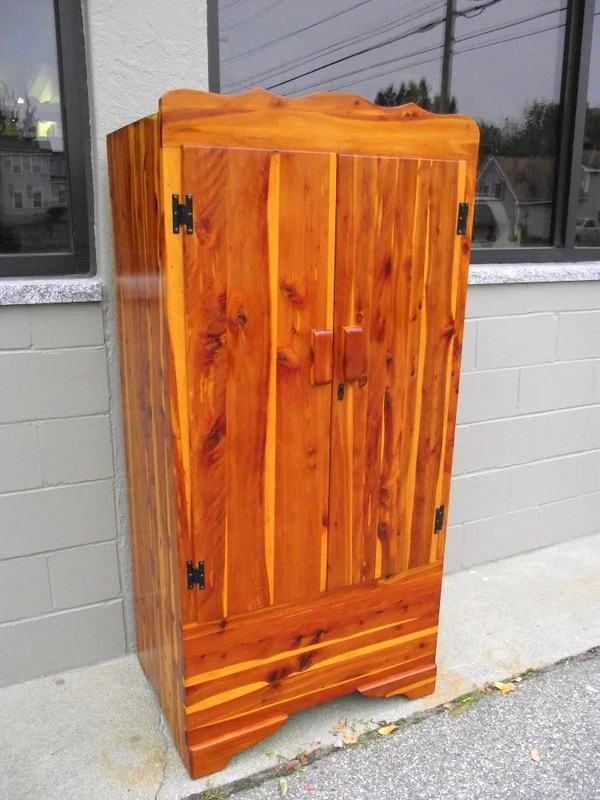Ever open your closet and think, “This smells less than fresh?” A cedar closet offers a breath of fresh air – literally. It’s a system for keeping clothes looking and smelling their best. This guide covers everything from “What is cedar?” to building your own closet or giving an existing one a cedar makeover. We’ll discuss costs, value, and alternatives for those with allergies. Ready to upgrade to a fragrant wardrobe haven? Keep reading.
The Magic of Cedar: More Than Just Storage
Imagine opening your closet to the warm scent of cedar, knowing your clothes are safe. That’s the magic of a cedar closet – a haven for garments, protecting them from moths while adding natural elegance to your home.
What is a Cedar Closet?
A cedar closet is typically a closet or chest lined with aromatic cedarwood, naturally gifted with moth-repelling superpowers thanks to plicatic acid. This natural insecticide protects wool sweaters, cashmere scarves, and delicate fabrics.
Benefits of Cedar Closets: A Closer Look
- Natural Insect Repellent: Cedar’s delightful aroma is offensive to moths and other fabric-damaging insects, offering natural protection without harsh chemicals.
- Humidity Control: Cedarwood absorbs moisture, preventing mildew and musty odors, especially helpful in humid climates.
- Fresh, Natural Scent: Cedar infuses clothes with a subtle, pleasant scent, adding a touch of luxury.
Cedar Closet Lifespan: A Deeper Dive
A well-maintained cedar closet can likely last 20 to 30 years, perhaps longer. Factors influencing longevity include:
- Environmental Factors: Humidity and temperature fluctuations can impact the wood. Too much moisture can lead to mold, while excessive dryness can cause cracking.
- Maintenance Practices: Regular oiling replenishes natural oils, while cleaning, sanding, and buffing maintain the aroma and effectiveness.
- Type of Cedar: Different cedar types have varying resistance to decay and insects.
Is a Cedar Closet Expensive? Exploring the Costs
Cedar closets are generally pricier than standard closets. Several factors influence the cost:
- Type of Cedar: Aromatic Eastern Red Cedar, known for its potent scent, tends to be more expensive.
- Wood Quality: Knotty planks or clear boards also affect the price.
- DIY vs. Professional: Installing cedar lining yourself significantly reduces costs compared to professional installation.
Here’s a cost overview:
| Option | Cost | Pros | Cons |
|---|---|---|---|
| DIY Lining | $100 – $500+ | Significant cost savings, sense of accomplishment, customizable | Requires time and effort, potential for imperfections if not experienced with DIY |
| Pre-fabricated Closet | $500 – $2,000+ | Easier installation, consistent quality | Less customization, may require some assembly |
| Professional Installation | $1,000 – $25,000+ | Impeccable finish, complex designs, saves time and effort | Most expensive, requires finding reputable contractors |
| Cedar Alternatives | $10 – $50+ | Most budget-friendly, easy to implement, provides some protection | Less effective, scent may not be as strong or long-lasting |
Planning Your Cedar Sanctuary: Choices and Considerations
Consider your storage needs, budget, and preferred cedar type. Aromatic Eastern Red Cedar is popular for its scent, but other varieties exist.
Building Your Own Cedar Closet: A DIY Adventure
Building a cedar closet can be a rewarding project:
- Measure: Accurate measurements are crucial.
- Choose Cedar: Select quality aromatic cedar planks or lining kits.
- Prep: Ensure clean, dry closet walls.
- Install: Attach planks carefully, starting from the bottom.
- Enjoy: Bask in the cedar aroma.
Upgrade your closet with a sturdy closet clothes rod to maximize hanging space. A closet shelf with rod combines hanging and folded storage.
The Easy Route: Lining an Existing Closet
Lining an existing closet with cedar panels or veneer is a simpler, more economical option. Online tutorials offer step-by-step guidance.
Maintaining Cedar Freshness: Tips and Tricks
Over time, the cedar aroma will likely fade. Lightly sanding the wood exposes fresh oils, and applying cedar oil boosts the scent.
Alternatives to Cedar: Other Options
For those with cedar allergies or other preferences, lavender sachets offer a fragrant alternative with some pest-repellent properties. Cedar hangers or mothballs (though with a strong odor) are also options.
Beyond the Closet: Cedar Storage Ideas
Cedar chests, drawer liners, and cedar blocks in storage bins offer additional storage solutions.
What’s the Point of a Cedar Closet? Protecting and Preserving
A cedar closet protects clothes from damage, surrounds them with a fresh scent, and adds a touch of luxury. Ongoing research suggests the benefits likely outweigh any potential drawbacks.
Revitalizing Your Cedar Haven: Restoring the Aroma
Lightly sand the closet’s interior surfaces to expose fresh cedar oils. Apply cedar oil, or use cedar sachets, blocks, or chips to enhance the aroma.
Scientific understanding of wood degradation and cedar’s effectiveness is constantly evolving. Current knowledge may be refined with future research. A cedar closet is an investment in protecting your clothing and adding elegance to your home, offering options for various budgets and preferences.
- Dora the Explorer Wipe-Off Fun: Safe & Mess-Free Activities for Little Explorers - April 18, 2025
- Does Lemongrass Repel Mosquitoes? Fact vs. Fiction + How to Use It - April 18, 2025
- Do Woodchucks Climb Trees?Fact vs. Fiction - April 18, 2025










